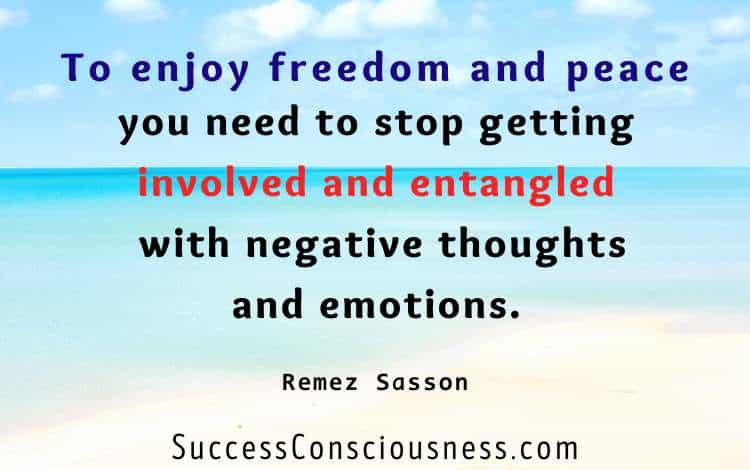
What does negative emotional involvement mean?
Negative emotional involvement refers to a state where a person is deeply engaged in emotions that are harmful or detrimental to their mental well-being.
Psychologically, this can manifest as feelings of anger, jealousy, resentment, or sadness that dominate a person’s thoughts and behaviors.
These negative emotions can lead to chronic stress, anxiety, and depression, affecting one’s overall mental health.

Live happier by mastering emotional detachment.
The Emotional Detachment GuideThe continuous engagement in these harmful emotions can create a feedback loop, where negative feelings reinforce negative thoughts, leading to a persistent state of emotional turmoil.
Spiritually, negative emotional involvement can be seen as a state of disconnection from one’s higher self or inner peace.
Many spiritual traditions emphasize the importance of maintaining a positive and balanced emotional state and some detachment to stay connected with one’s true nature and the larger universe.
When you are caught up in negative emotions, you may feel disconnected from your sense of purpose, inner peace, or spiritual well-being. This disconnection can lead to feelings of emptiness, a lack of fulfillment, and a sense of being spiritually adrift.

Weekly lessons with guidance, actionable tips, and exercises to help you step beyond the daily, ordinary life, expand your consciousness and awareness, and cultivate a life of mindfulness, inner peace, and self-awareness.
👉 Join the Inner Awakening Weekly Lessons Membership
Negative emotional involvement can have profound psychological and spiritual effects on one’s life. It can strain relationships, hinder personal growth, and reduce the ability to experience joy and contentment.
Recognizing and addressing these negative emotions is crucial for mental and spiritual health.
Techniques such as mindfulness, therapy, meditation, yoga, and other spiritual practices can help manage and overcome negative emotional involvement, nurturing a more balanced, peaceful, and fulfilling life.
Emotional Detachment – A Way to Overcome Negative Emotional Involvement
What is emotional detachment? A few articles on this website have covered this topic.
Emotional detachment means non-involvement, letting go, and not allowing negative feelings and thoughts to affect your feelings and state of mind.
- Inner Awakening Weekly Lessons — Weekly practices for stepping beyond the daily, ordinary life.
- Moments of Joy — A guide to daily happiness from within.
- How to Focus Your Attention — Excercises to cut distraction and build concentration.
- Manifest & Achieve Whatever You Want — Step-by-step visualization for success.
This consequently leads to inner peace, tranquility, and happiness.
Here are a few paragraphs from the book Emotional Detachment for Happier Life defining what emotional detachment means:
“Emotional detachment is the ability to avoid getting emotionally involved with your and other people’s negative thoughts and feelings.
Every week, you'll get access to exclusive, members-only short lessons with practical exercises and uplifting insights. These lessons are structured to help you pause, stay grounded, and handle life’s challenges with calm and strength.
👉 Subscribe for the Weekly Calm Lessons
It is the ability to stop taking things personally and remain calm in the various situations of your daily life.
Emotional detachment helps you create boundaries, which protect you from the adverse effects of other people’s emotions and states of mind. This skill also enables you to cut the ropes that tie your emotional burden to your back.
Emotional detachment allows you to let go of worries and negative thoughts and helps you avoid getting involved with distressing and harmful emotions.
It can protect you from getting agitated by what people say or do and help you remain composed and levelheaded in difficult situations and when in the company of unpleasant people.”
Benefits of Avoiding Negative Emotional Involvement
Avoiding negative emotional involvement offers numerous benefits that enhance both mental and physical well-being.
Psychologically, distancing oneself from harmful emotions such as anger, jealousy, and resentment can reduce stress levels and lower the risk of anxiety and depression.
This emotional clarity allows for better decision-making and improved focus, as the mind is not clouded by negative thoughts. It also promotes resilience, enabling you to cope more effectively with life’s challenges and setbacks.
Physically, avoiding negative emotional involvement has tangible health benefits. Chronic stress and negative emotions can lead to a range of health issues, including hypertension and weakened immune response.
By maintaining a positive emotional state, the body can function more optimally, leading to better sleep, more energy, and a stronger immune system.

Live happier by mastering emotional detachment.
The Emotional Detachment GuideSpiritually, steering clear of negative emotional involvement can lead to a deeper connection with one’s inner self and a greater sense of inner peace.
It allows the cultivation of positive emotions such as gratitude, compassion, joy, and satisfaction, which are pathways to spiritual growth and fulfillment.
This positive emotional state enhances the ability to connect with others and the world around us, building a sense of unity and purpose.
Ultimately, by avoiding negative emotional involvement, you can achieve a more harmonious and balanced life filled with a profound sense of well-being, peace, and freedom.
How to Avoid Negative Emotional Involvement
Now, you might be asking how to avoid negative emotional involvement. Well, for this you need some training. This is why I wrote the book Emotional Detachment for Happier Life.
This book offers various techniques and ways to develop a certain degree of emotional detachment and avoid getting involved with negative thoughts and emotions, both yours and other people’s.
Tips to Avoid Negative Emotional Involvement
After explaining emotional detachment and emotional involvement meaning, here are a tips you will find useful:
1. Practice Mindfulness and Meditation:
Engage in regular mindfulness practices or meditation to stay present and aware of your thoughts and feelings. This can help you recognize and manage negative emotions before they escalate.
Meditation and mindfulness are, in my opinion. two of the best means to counteract negative emotional involvement.
2. Set Boundaries:
Establish clear boundaries in your personal and professional relationships. Learn to say no when necessary and protect your emotional well-being by not allowing others’ negativity to affect you.
3. Cultivate Positive Relationships:
Surround yourself with supportive and positive people who uplift and encourage you. Positive social interactions can significantly reduce the impact of negative emotions and promote emotional well-being.
4. Limit Exposure to Negative Media:
Be mindful of your consumption of news, social media, and other forms of media that can be sources of negativity. Limiting exposure can help reduce feelings of stress and anxiety.
Join The Path to Awakening — a practical online meditation course that guides you step by step to inner peace, heightened awareness, and awakening beyond daily distractions.
👉Explore The Online Meditation Course
5. Engage in Positive Affirmations:
Use positive affirmations to reinforce self-worth and combat negative self-talk. Repeating positive statements can help reframe your mindset and build confidence.
6. Practice Forgiveness:
Work on forgiving yourself and others for past mistakes or wrongdoings. Holding onto grudges and resentment can perpetuate negative emotional involvement.
Forgiveness can release you from the burden of negative emotions and promote healing.
These are just a few simple ways, the first steps toward cultivating non-involvement with negative emotions and thoughts.
“To enjoy freedom and peace, you need to stop getting involved and entangled with negative thoughts and emotions.”

Live happier by mastering emotional detachment.
The Emotional Detachment Guide
 Founder of SuccessConsciousness.com,
Founder of SuccessConsciousness.com,